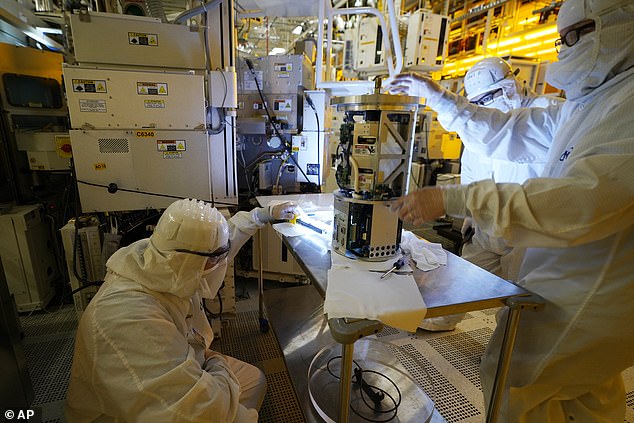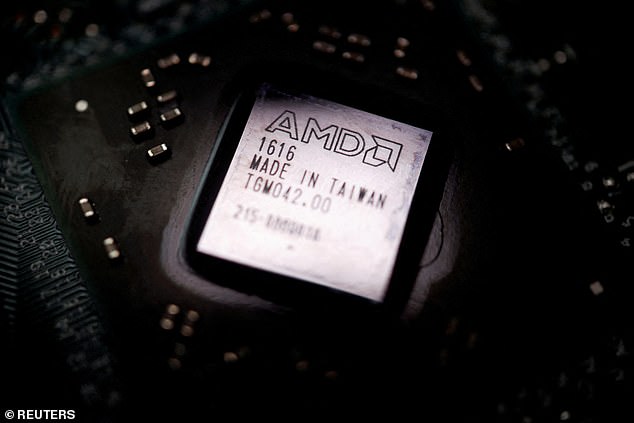‘Biden’s DEI rules are worse than HAMAS’: Top microchip makers are postponing US expansion and instead expanding in dangerous Israel and Russia because American grants come with so many ‘equity’ caveats
Top microchip makers are postponing their expansion into the US and setting up operations in Israel and Russia due to the equity constraints required to receive US government subsidies.
The Biden administration pledged earlier this year to hand out $39 billion in subsidies to boost semiconductor manufacturing in the U.S.
However, shortly after the announcement, Intel announced that they would be delaying their Columbus factory, while Samsung was also delaying their Texas factory.
Despite the billions in subsidies, two experts believe that the tech companies’ decision to withdraw from building manufacturing facilities in the US stems from diversity, equality and inclusion policies.
In an opinion piece for The hillStrive Asset Management CEO Matt Cole and the firm’s head of research Chris Nicholson say the subsidies are so “laden with DEI that they can’t move.”
The Biden administration pledged earlier this year to hand out $39 billion in subsidies to boost semiconductor manufacturing in the U.S.

Two experts believe that the tech companies’ decision to withdraw from building manufacturing facilities in the US stems from diversity, equality and inclusion policies. Pictured: Technicians inspect a device during a tour of Micron Technology’s automotive chip factory
The pair say Intel has now built factories in Poland and Israel, meaning they would rather deal with the threat of Hamas missiles and Russian aggression than the government’s DEI regime.
As Samsung moves to make South Korea the home of its semiconductor factory.
Taiwan Semiconductor Manufacturing Company (TSMC) has also cut production at a second plant in Arizona.
The subsidies are paid for by the CHIPS and Science Act, a $280 billion bill to fund domestic semiconductor chip production and increase competitiveness with China.
The package includes $52 billion in financing for U.S. companies to produce computer chips, as well as a 25 percent tax break for companies investing in the market.
It includes $39 billion for chip makers to expand and modernize their technologies.
The law also authorized the grant of $11 billion to the Department of Commerce for research and development and another $81 billion to the National Science Foundation.
In their piece, Cole and Nicholson said part of the CHIPS money calls for creating Chief Diversity Officers and helping minority groups.


CEO of Strive Asset Management Matt Cole, right, and the company’s head of research Chris Nicholson, left, say the subsidies are so ‘laden with DEI that they can’t move’

Intel built a factory in Israel, which means they would rather deal with the threat of Hamas missiles (pictured) than the government’s DEI regime

The CHIPS and Science Act grants call for the creation of Chief Diversity Officers and outreach to minority groups. Pictured: A graphics processing unit chip made by Advanced Micro Devices Inc
It also calls on chipmakers to “increase the participation of economically disadvantaged individuals in the semiconductor workforce.”
The two added, “In short, the world’s top chipmakers are tired of being pawns in the CHIPS Act’s political games.
“They quietly gave up on America. Intel needs to know that the upcoming subsidies are election-year stunts – mere declarations of intent that will go unheeded.
“Even after due diligence and final agreements, the money will only be released piecemeal if recipients prove they are jumping through the right hoops.”
They also added that chipmakers should ensure that they employ female construction workers at the companies.
In a 2023 report from the Bureau of Labor, they said that 10.8 percent of construction workers in the US are women.
Despite the small numbers, companies must provide childcare for the workers and engineers who, according to the two, “do not yet exist.”
They add, “This is the stuff declining empires are made of. While America pursues national security by building a diverse workforce, China does so by building warships.
“Instead of solving the problem, those in charge are trying to cover up the problem long enough to win re-election.
“Don’t be fooled by the Biden administration’s upcoming weekend-at-Bernie act — the CHIPS Act is dead.”
